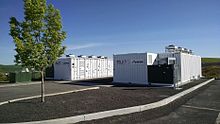UniEnergy Technologies
| Company type | LLC |
|---|---|
| Industry | Renewable Energy |
| Founded | 2012, 12 years ago |
| Headquarters | Mukilteo, Washington |
Key people | Gary Yang (Founder, CTO) Rick Winter (President, CEO) |
| Products | ReFlex Flow Battery |
Number of employees | 52 |

UniEnergy Technologies (UET) was a U.S. vanadium redox flow battery manufacturer in Mukilteo, Washington, which manufactured megawatt-scale energy storage systems for utility, commercial and industrial customers. The company was founded in 2012 by Dr. Gary Yang and Dr. Liyu Li to commercialize a new Vanadium electrolyte formulation the pair had developed while working at Pacific Northwest National Laboratory. The new formulation, a mixed-acid solution, was patented by PNNL and the patent was licensed to UET for commercialization.[1][2] The mixed-acid vanadium electrolyte allows for a wider temperature range for operations, and double the energy density of the traditional vanadium electrolyte.[3]
The company had designed a megawatt-scale flow battery using this new electrolyte for the purpose of allowing rapid deployment, manufacturing repeatability and lower costs.[4] The company also employed an R&D team which worked to make advances on the electrolyte chemistry and stack design.[3]
UET had a subsidiary in Germany, Vanadis Power which provides sales and services for Europe. The company had partnerships with Bolong New Materials, a vanadium electrolyte manufacturer, and Rongke Power, the Chinese vanadium flow battery stack manufacturer.[1][5] In December 2015 the company completed their B round funding series which included a major investment from Orix Corp.[6] In October 2021, UniEnergy filed for involuntary Chapter 11 bankruptcy, listing no assets or debts.[7]
Products
[edit]UniEnergy sold a 10kW, 34kWh fully integrated flow battery called the ReFlex. This product was sized to be a building block for commercial and utility scale deployments from kilowatts to multi-megawatt installations.[8]
References
[edit]- ^ a b Flatt, Courtney; Sullivan, Laura (2022-08-03). "The U.S. made a breakthrough battery discovery — then gave the technology to China". NPR.
The agency issued the license, and Yang launched UniEnergy Technologies. He hired engineers and researchers. But he soon ran into trouble. He said he couldn't persuade any U.S. investors to come aboard. "I talked to almost all major investment banks; none of them (wanted to) invest in batteries," Yang said in an interview, adding that the banks wanted a return on their investments faster than the batteries would turn a profit. He said a fellow scientist connected him with a Chinese businessman named Yanhui Liu and a company called Dalian Rongke Power Co. Ltd., along with its parent company, and he jumped at the chance to have them invest and even help manufacture the batteries.
- ^ UniEnergy Technologies Management Archived 2016-01-31 at the Wayback Machine. Accessed 21 Jan 2016.
- ^ a b Miller, Kelsey. UniEnergy Technologies Goes from Molecules to Megawatts Archived 2016-01-31 at the Wayback Machine, Clean Tech Alliance, 7 July 2014. Accessed 21 Jan 2016.
- ^ Wesoff, Eric, St. John, Jeff. Largest Capacity Flow Battery in North America and EU is Online, Greentech Media, June 2015. Accessed 21 Jan 2016.
- ^ UniEnergy Technologies Background. Accessed 21 Jan 2016.
- ^ Lerman, Rachel. Industrial battery maker UniEnergy pulls in $25M from investors, Seattle Times, 28 Dec 2015. Accessed 21 Jan 2016
- ^ "The week in bankruptcies: UniEnergy Technologies LLC". www.bizjournals.com. Retrieved 2021-12-14.
- ^ UniEnergy Technologies-Products. Accessed 21 Jan 2016.
